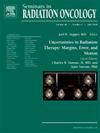Oral Mucositis in Head and Neck Cancer Patients
IF 3.2
3区 医学
Q3 ONCOLOGY
引用次数: 0
Abstract
Oral mucositis (OM) is a common side effect of radiation therapy for head and neck cancer (HNC). Despite the medical advances in cancer therapy, OM is still virtually inevitable in patients being irradiated for neoplasms of the head and neck. The initial signs of oral mucositis typically manifest after cumulative doses between 15 and 20 Gy, with ulceration formation by 30 Gy and reaching peak severity in the week after radiation treatment completion (generally 60-72 Gy in management of HNC), then resolving over the 3-4 weeks following treatment completion. Severe oral mucositis (SOM), defined as WHO grade 3 and grade 4, occurs in 65-70% of patients receiving concurrent cisplatin and radiation therapy for locoregionally advanced HNC. WHO grade 3 or 4 oral mucositis leads to risk of systemic infection, severe pain, reduced oral intake which can lead to dehydration, significant weight loss and malnutrition, need for feeding tube placement and hospitalization. The clinical and economic impact, not to mention the impact on patient quality of life from oral mucositis has been well studied. As mucositis is commonly the dose-limiting factor leading to disruption or delay in cancer therapy, establishment of evidence-based guidelines has been paramount in supportive care management of these patients. Improvements in the prevention and treatment of oral mucositis remain essential to better patient outcomes. Here we review the current standard of care, recent successes and failures in development of therapies to mitigate OM, share patient and provider educational resources, and describe on-going and future directions of research in this area.
头颈部肿瘤患者的口腔黏膜炎
口腔黏膜炎(OM)是头颈癌(HNC)放射治疗的常见副作用。尽管癌症治疗在医学上取得了进步,但对于因头颈部肿瘤而接受放射治疗的患者来说,OM实际上仍然是不可避免的。口腔黏膜炎的最初症状通常在累积剂量为15至20 Gy后出现,在30 Gy时形成溃疡,并在放射治疗完成后一周内达到严重程度高峰(HNC治疗通常为60-72 Gy),然后在治疗完成后3-4周内消退。重度口腔黏膜炎(SOM)被WHO定义为3级和4级,65-70%的局部晚期HNC患者同时接受顺铂和放射治疗。世卫组织3级或4级口腔黏膜炎可导致全身性感染、剧烈疼痛、可导致脱水的口服摄入量减少、体重显著减轻和营养不良、需要放置饲管和住院。口腔黏膜炎的临床和经济影响,更不用说对患者生活质量的影响已经得到了很好的研究。由于粘膜炎通常是导致癌症治疗中断或延迟的剂量限制因素,因此建立循证指南在这些患者的支持性护理管理中至关重要。改善口腔黏膜炎的预防和治疗对改善患者的预后至关重要。在这里,我们回顾了当前的护理标准,最近的成功和失败的治疗发展,以减轻OM,共享患者和提供者的教育资源,并描述了正在进行的和未来的研究方向在这一领域。
本文章由计算机程序翻译,如有差异,请以英文原文为准。
求助全文
约1分钟内获得全文
求助全文
来源期刊
CiteScore
5.80
自引率
0.00%
发文量
48
审稿时长
>12 weeks
期刊介绍:
Each issue of Seminars in Radiation Oncology is compiled by a guest editor to address a specific topic in the specialty, presenting definitive information on areas of rapid change and development. A significant number of articles report new scientific information. Topics covered include tumor biology, diagnosis, medical and surgical management of the patient, and new technologies.

 求助内容:
求助内容: 应助结果提醒方式:
应助结果提醒方式:


